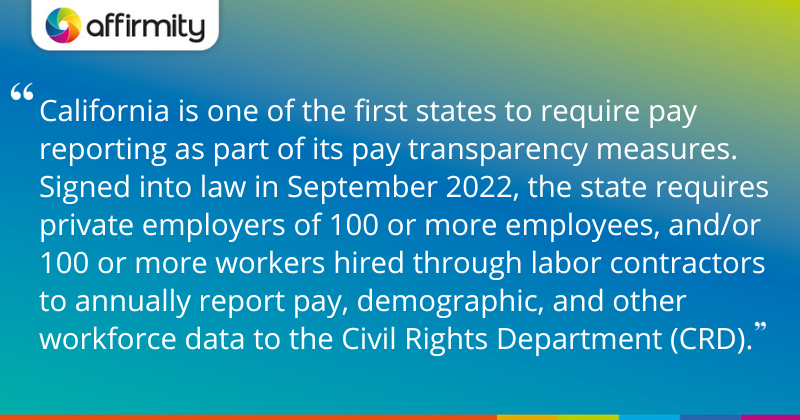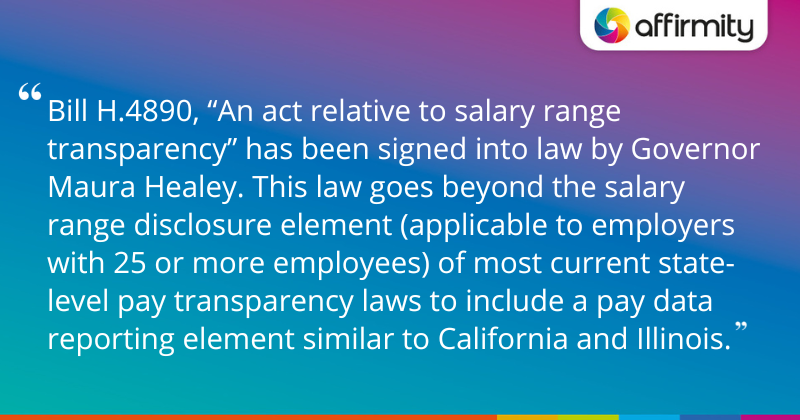Pay transparency is one of the biggest emerging legislative trends in the diversity, equity, and inclusion sphere. Whether requiring organizations to be less opaque about compensation in job listings, banning pay secrecy clauses in employment contracts, or compelling businesses to report how their workforce is paid, this wave of new laws presents new challenges. In this article, we’ve summarized the notable state-level pay transparency laws—existing and upcoming—that you need to be aware of.
GET THIS INFORMATION IN AN INFOGRAPHIC | ‘Your Visual Guide to State-Level Pay Transparency Laws [September 2024]‘
Currently Enacted State-Level Pay Transparency Laws
California
Job posting disclosure and pay reporting

California law requires employers with at least 15 workers to include pay ranges in job postings. Furthermore, California is one of the first states to require pay reporting as part of its pay transparency measures.
Signed into law in September 2022, the state requires “private employers of 100 or more employees, and/or 100 or more workers hired through labor contractors to annually report pay, demographic, and other workforce data to the Civil Rights Department (CRD)”. Note that if you have the specified number of employees in total, this law applies to your organization if you have at least one employee or labor contractor based in California.
Eligible employers must submit separate payroll employee and labor contractor employee reports via the state’s portal, as applicable.
More information about California’s pay data reporting measures can be found on the California CRD’s FAQ.
LEARN ABOUT THE LAW AND AFFIRMITY’S PAY DATA REPORTING MODULE | ‘Update: New State Obligations for Reporting California Pay Data’
Colorado
Job posting disclosure
Colorado’s law originally took effect on January 1, 2021 with amendments in June 2023. Pay transparency is the second part of Colorado’s Equal Pay for Equal Work Act, requiring “employers to disclose compensation in all job postings and notices, both internal and public.” Part one concerns unequal pay and prohibits employers from asking about pay, not allowing employees to discuss pay, and forbids various forms of retaliation.
The act applies to any organization employing at least one employee in Colorado. With respect to the second part of the law, the employer must also disclose:
- Information about benefits and how and when to apply in all job postings and notices
- Available job opportunities to all employees and, subsequently, who was selected to fill the position
- How to advance through career progression, if the employer offers career progression for the role
Employers are also required to preserve records of wages and job descriptions.
See the state’s Equal Pay for Equal Work Act page for more information.
Hawaii
Job posting disclosure
Hawaii’s 2023 Act 203 intends to reduce pay inequalities by:
- Requiring disclosure of an hourly rate or salary range that reasonably reflects actual expected compensation in job listings (e.g. avoiding unreasonably large salary ranges). Note that this doesn’t apply to:
- Positions that are internal transfers or promotions within a current employer
- Public employee positions where compensation is determined pursuant to collective bargaining
- “Prohibiting an employer from discriminating between employees because of any protected category by paying wages to employees in an establishment at a rate less than the rate at which the employer pays wages to other employees in the establishment for substantially similar work.”
The law applies to employers with 50 or more employees. Effective as of January 1, 2024, the law was expanded beyond pay discrimination based on sex to cover a wider range of protected categories, including race, gender identity, sexual orientation, age, religion, color, ancestry, disability, marital status, and more.
The text of 2023 Act 203 is available here.
Illinois
Pay reporting

Illinois requires private businesses with 100 or more employees in or reporting to locations in the state to apply for an Equal Pay Registration Certificate (EPRC). Employers must submit demographic and wage data to the Illinois Department of Labor (IDOL), along with their most recent EEO-1 report and a statement “certifying that, among other things, the average compensation for its female and minority employees is not consistently below the average compensation for its male and non-minority employees.”
The certificate is valid for a period of two years, after which businesses must recertify.
For more information about the EPRC, see IDOL’s dedicated FAQ page.
Note: See below for the Illinois entry in the “Incoming State-Level Pay Transparency Laws” for information on the state’s upcoming job posting disclosure law.
Maryland
Job posting disclosure
Maryland’s Wage Transparency Law (SB 525/HB 649) came into effect on October 1, 2024, requiring employers to disclose the wage or salary range of any public or internal job postings. If a job posting is not made available to the applicant, the information must be disclosed before a discussion of compensation is held or when requested by the applicant. The law also requires employers to maintain records of wages, job classifications, and other employment conditions for three years after the position is filled (or three years after posting, if the position remains unfilled).
New York State
Job posting disclosure
As of September 17, 2023, New York State businesses with four or more employees must list compensation ranges for job opportunities, promotions, and transfers when that job will be performed at least in part in the state. The law also applies if the role reports to a supervisor, office, or work site in the state, regardless of whether the employee is operating in the state.
Employers must also disclose if a position is commission-based, and the law prohibits retaliation for open discussion of compensation between coworkers.
You can find out more about this law on the New York State Department of Labor website.
STAY AHEAD OF PAY EQUITY LAW AT THE FEDERAL LEVEL | ‘Pay Equity Reporting FAQs: Answers to 10 of Your Questions After OFCCP Scheduling Letter Updates’
Washington State
Job posting disclosure
Washington State’s Equal Pay & Opportunities Act applies to all private and public employers doing business in Washington with no exemption for collective bargaining agreements. Employers with 15 or more employees must include a wage scale or salary range in job postings. Other measures include wage and salary history privacy and retaliation protections.
You can read more about this act on the Washington State Department of Labor & Industries website.
Other Notable Jurisdictions
New York City has its own law around salary transparency in job advertisements that applies to employers with four or more employees or one or more domestic workers. Employment agencies are covered by the law, while temporary help firms are not.
Washington D.C.’s pay transparency law came into effect on June 30, 2024. It requires employers in the district to provide the minimum and maximum projected salary or hourly pay in all job listings and positions advertised. Disclosure must be external and internal.
Incoming State-Level Pay Transparency Laws
Illinois
Job posting disclosure
Enacted Effective: January 1, 2025
Illinois amended its equal pay act in August 2023 to require pay transparency in job postings, effective to all postings published January 1, 2025 onwards. The law will apply to organizations with at least 15 employees, where positions are in or are reporting to individuals in Illinois. The law allows for the information to be hyperlinked in the job description, rather than strictly requiring that it be written into every posting.
In the absence of a job posting, but in the event of a job offer, the employer must disclose the position’s pay scale and benefits to the applicant. Employers must maintain records of both pay scale and benefits for each position.
You can read the bill status of HB3129 on the Illinois General Assembly website.
Note that Illinois already requires pay data reporting—see the ‘Currently Enacted State-Level Pay Transparency Laws’ section above for more information.
Minnesota
Job posting disclosure
Enacted Effective: January 1, 2025
Minnesota’s 2024 Omnibus Labor and Industry Policy bill included Article 7 Sec. 2. [181.173] Salary Ranges Required in Job Postings, which applies to employers with 30 or more employees at one or more sites in the state. Once the section comes into effect in 2025, employers must disclose the starting salary range, as well as a general description of all benefits and other compensation. If an employer doesn’t plan to offer a salary range for a position, it must list a fixed pay rate.
An earlier law, which took effect in January 2024, prohibits employers from asking about or considering an applicant’s past or current pay during the hiring process.
MORE ON PAY EQUITY | ‘A 5-Point Plan for Designing a Culture That Embraces Pay Equity’
Vermont
Job posting disclosure
Enacted Effective: July 1, 2025
Vermont’s KH.704 (Act 144) calls for the disclosure of compensation ranges in all advertisements for “Vermont job openings”, with this defined as positions physically located in Vermont or predominantly performing work for an office or work location in the state. Openings paid on a commission basis must disclose that fact, and openings paid on a tipped basis must disclose this information along with the range of base wages. The law applies to organizations of five or more employees.

Massachusetts
Job posting disclosure and pay reporting
Enacted Effective: February 1, 2025 (pay reporting) July 31, 2025 (job posting disclosure)
Bill H.4890, “An act relative to salary range transparency” has been signed into law by Governor Maura Healey. The law has two major elements, one relating to salary range disclosure, and another that includes a pay data reporting element similar to those in California and Illinois. The pay data reporting element comes into effect sooner (February 1, 2025), after which employers with 100 or more employees will be required to:
- Share annual federal wage and workforce data reports (i.e. EEO-1, EEO-3, EEO-4, and EEO-5 reports, as applicable) with the Massachusetts Executive Office of Labor and Workforce Development
- Include reports for workforce demographics and pay categorized by race, ethnicity, gender, sex, and job category
From the end of July 2025, employers in Massachusetts with 25 or more employees must additionally disclose salary ranges in job postings.
More information about Bill H.4890 can be found on the website of the Massachusetts legislature.
To learn more about Affirmity’s Pay Data Reporting Module, or to talk to an expert about how we can support your pay transparency efforts, please contact us today.
About the Author

Patrick McNiel, PhD, is a principal business consultant for Affirmity. Dr. McNiel advises clients on issues related to workforce measurement and statistical analysis, diversity and inclusion, OFCCP and EEOC compliance, and pay equity. Dr. McNiel has over ten years of experience as a generalist in the field of Industrial and Organizational Psychology and has focused on employee selection and assessment for most of his career. He received his PhD in I-O Psychology from the Georgia Institute of Technology. Connect with him on LinkedIn.
